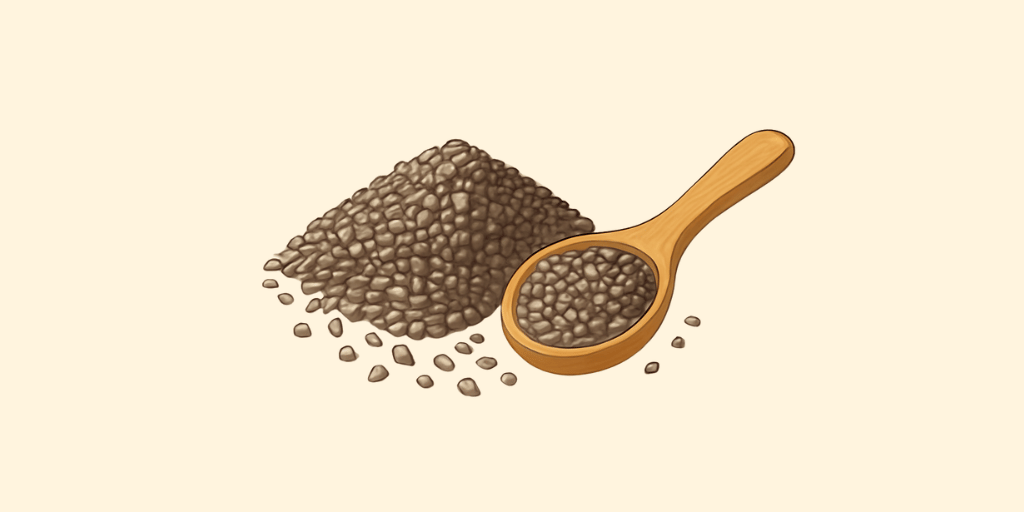Sanskrit Name: –
Devanagari Name: चिया बीज
Botanical Name: Salvia hispanica
English Name: Chia Seeds
Description:
Chia seeds, originating from Central and South America, are small black or white seeds from the Salvia hispanica plant. These nutrient-rich seeds have been a dietary staple for centuries and are now recognized worldwide as a superfood.
Despite their diminutive size, chia seeds are loaded with vital nutrients, such as dietary fiber, omega-3 fatty acids, protein, antioxidants, and essential minerals like calcium, magnesium, and potassium.
A notable characteristic of chia seeds is their capacity to absorb water, creating a gel-like texture, which makes them a fantastic addition to smoothies, puddings, and baked goods. Their high fiber content aids digestive health by encouraging regular bowel movements and supporting gut function. Chia seeds are also a great source of plant-based omega-3s, which can help lower inflammation, enhance heart health, and boost cognitive performance.
Thanks to their substantial protein content, chia seeds provide lasting energy, making them popular among fitness enthusiasts. Moreover, they assist in regulating blood sugar levels, making them a good choice for those managing diabetes. Their antioxidants help fight free radicals, promoting healthier skin and delaying aging signs. Incorporating chia seeds into your diet can also aid in weight management by increasing feelings of fullness.
Benefits – through the lens of Ayurveda:
Chia seeds (Salvia hispanica) are not mentioned in the classical Ayurvedic texts such as Charaka Samhita, Sushruta Samhita, or Bhavaprakasha Nighantu, because they are native to Central and South America and were introduced to India only in recent times.
Main Chemical Components:
- Alpha-linolenic acid (omega-3)
- Quercetin
- Caffeic acid
Nutritional Components:
- Dietary fiber
- Protein
- Calcium
- Magnesium.
Medical Conditions(Relief):
- Chia Seeds provide relief for digestive issues like constipation and bloating due to their high fiber content.
- They support heart health by improving cholesterol levels, lowering blood pressure, and reducing inflammation.
- They also aid in weight management by promoting satiety, improving skin health, and boosting immunity.
- Additionally, they are excellent for maintaining healthy blood sugar levels and supporting skin health by reducing inflammation and oxidative stress.
Medical Conditions(Avoid):
- Chia seeds should be avoided by individuals with low blood pressure, as they may lower blood pressure further.
- People with digestive disorders or sensitive stomachs should consume chia seeds in moderation, as they may cause bloating.
- Pregnant and breastfeeding women should consult a healthcare provider before using chia seeds in large amounts.
References:
- Grancieri M, Martino HS, Gonzalez de Mejia E. Chia seed (Salvia hispanica L.) as a source of proteins and bioactive peptides with health benefits: A review. Comprehensive Reviews in Food Science and Food Safety. 2019 Mar;18(2):480-99.
- Agarwal A, Rizwana, Tripathi AD, Kumar T, Sharma KP, Patel SKS. Nutritional and Functional New Perspectives and Potential Health Benefits of Quinoa and Chia Seeds. Antioxidants. 2023; 12(7):1413. https://doi.org/10.3390/antiox12071413
- Ferreira, D.M.; Nunes, M.A.; Santo, L.E.; Machado, S.; Costa, A.S.G.; Álvarez-Ortí, M.; Pardo, J.E.; Oliveira, M.B.P.P.; Alves, R.C. Characterization of chia seeds, cold-pressed oil, and defatted cake: An ancient grain for modern food production. Molecules 2023, 28, 723. [Google Scholar] [CrossRef] [PubMed]
- Kozio, M.J. Chemical composition and nutritional evaluation of quinoa (Chenopodium quinoa Willd.). J. Food Compos. Anal. 1992, 5, 35–68. [Google Scholar] [CrossRef]
- Ghafoor, K.; Juhaimi, F.A.; Ozcan, M.M.; Uslu, N.; Ahmed, I.A.M.; Babiker, E.E. The effect of boiling, germination and roasting on bioactive properties, phenolic compounds, fatty acids and minerals of chia seed (Salvia hispanica L.) and oils. Int. J. Gastron. Food Sci. 2022, 27, 100447. [Google Scholar] [CrossRef]
- Kakkar, S.; Tandon, R.; Tandon, N. The rising status of edible seeds in lifestyle related diseases: A review. Food Chem. 2023, 402, 134220. [Google Scholar] [CrossRef]
- Cueto, M.; Porras-Saavedra, J.; Farroni, A.; Alamilla-Beltran, L.; Schoenlechner, R.; Schleining, G.; Buera, P. Physical and mechanical properties of maize extrudates as affected by the addition of chia and quinoa seeds and antioxidants. J. Food Eng. 2015, 167, 139–146. [Google Scholar] [CrossRef]
- Goyat, J.; Passi, S.J.; Suri, S.; Dutta, H. Development of Chia (Salvia hispanica, L.) and Quinoa (Chenopodium quinoa, L.) seed flour substituted cookies- Physicochemical, nutritional and storage studies. Curr. Res. Nutr. Food Sci. J. 2018, 6, 757–769. [Google Scholar] [CrossRef]
- Oteri, M.; Bartolomeo, G.; Rigano, F.; Aspromonte, J.; Trovato, E.; Purcaro, G.; Dugo, P.; Mondello, L.; Beccaria, M. Comprehensive chemical characterization of chia (Salvia hispanica L.) seed oil with a focus on minor lipid components. Foods 2023, 12, 23. [Google Scholar] [CrossRef]

